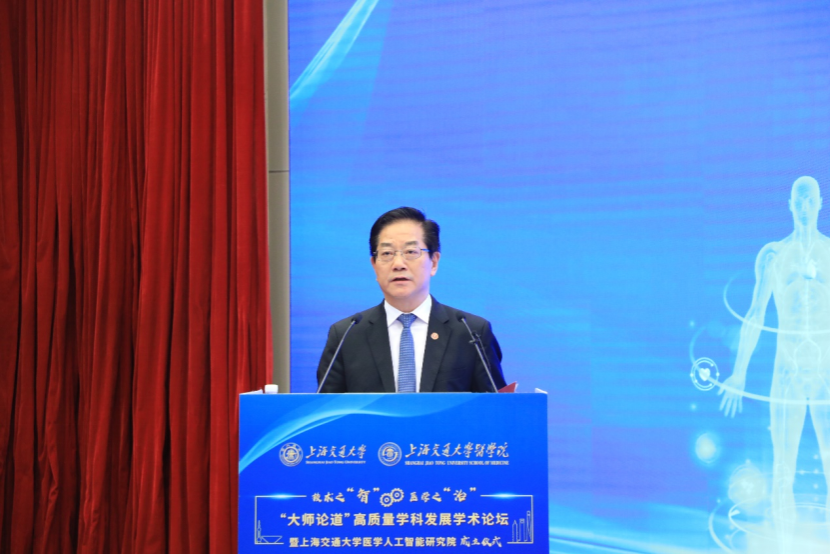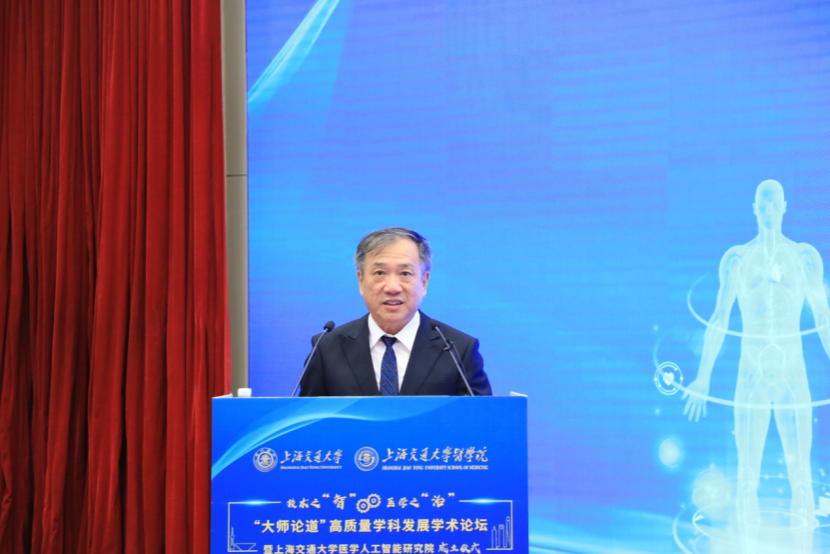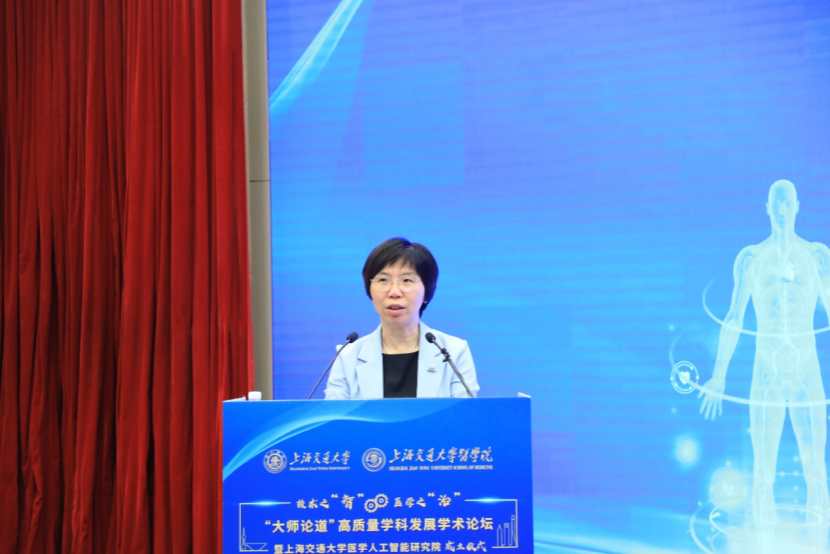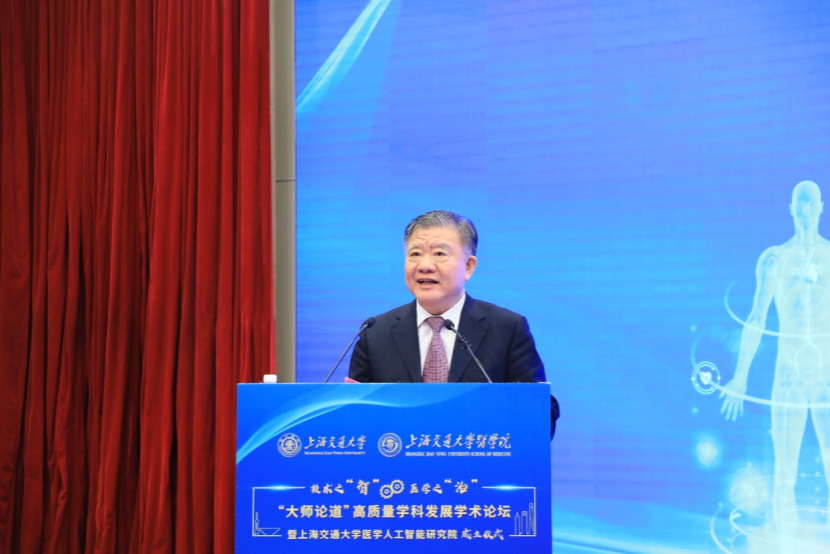On June 27, the inauguration ceremony of the Institute of Medical Artificial Intelligence of Shanghai Jiao Tong University and the Masters’ Forum on High-Quality Discipline Development was held at the School of Medicine. The event was attended by numerous prominent guests,leaders from various Shanghai government departments, districts, and affiliated hospitals, along with representatives from industry, alumni, faculty, and students.
In the presence of all attendees, the Institute of Medical Artificial Intelligence of Shanghai Jiao Tong University was officially inaugurated.

Academician Fan Xianqun, Vice President of Shanghai Jiao Tong University and Chancellor of the School of Medicine, delivers the welcome speech and outlines the Institute’s development plan. Fan Xianqun extended a warm welcome to all guests on behalf of the university. He expressed hopes that the Institute would take the lead in exploring new models for scientific research, institutional mechanisms, and clinical translation. The Institute will focus on addressing major national health needs by building a closed-loop ecosystem—from application-driven innovation to original technological breakthroughs and clinical implementation. By bridging gaps between medicine and engineering, data sharing, technological innovation, and clinical practice, the Institute aims to become a source of medical AI innovation and a hub for top-tier talent, ultimately establishing a globally influential technological and practical paradigm.

Yang Zhenbin, Party Secretary of Shanghai Jiao Tong University, delivers a speech. Secretary Yang offered three key expectations for the Institute’s future development: 1. Address major disease prevention and treatment needs by breaking down disciplinary barriers and nurturing new academic breakthroughs. 2. Cultivate interdisciplinary talent with strong medical knowledge, solid quantitative foundations, and advanced AI expertise, supporting Shanghai’s ambition to become a global center for medical AI. 3. Establish a full-chain pathway for the transformation of medical AI research into practical applications, such as intelligent diagnostic tools and decision-support systems.

Zhang Ying, Deputy Secretary-General of the Shanghai Municipal Government and Director of the Municipal Commission of Economy and Informatization, delivers a speech.Speaking on behalf of the Shanghai Municipal Government, Zhang Ying congratulated the university on the establishment of the Institute. She emphasized that the integration of medicine and AI is becoming a new frontier in global science and industry competition. With technologies like multimodal foundation models, AI for Science (AI4S), and smart wearables rapidly evolving, accelerating medical innovation is critical to public wellbeing and the city’s future. She expressed hope that the Institute would focus on the health concerns of the people and contribute more “SJTU strength” to a smarter, more inclusive healthcare system.

Academician Chen Zhu delivers a speech. Chen Zhu emphasized that the integrated development of education, science, and talent is a core national strategy, as outlined in the 20th National Congress of the Communist Party of China and reaffirmed by the recent Third Plenary Session of the 20th Central Committee. He noted that medical AI has shown unique advantages and great value in breaking bottlenecks in chronic disease treatment and improving primary care capacity. He expressed hope that the Institute would become a world-leading center for “Medicine + AI” innovation and talent development, contributing significantly to the progress of public health and medical education.
Following the inauguration, the 22nd session of the “Masters’ Forum” High-Quality Discipline Development took place.
Academician Chen Zhu delivered a keynote speech titled “Tech Empowerment for the Prevention and Control of Non-Communicable Chronic Diseases”. He systematically addressed the role of science and technology in preventing and treating key chronic diseases, emphasizing the need to deepen research in preventive medicine and epidemiology, unlock the value of intelligent health data, and apply smart technologies to chronic disease management.
Academician E Weinan presented on “The Practice and Insights of AI for Science”, highlighting recent advances and applications of machine learning in scientific research. He illustrated how AI is accelerating scientific discovery and driving the transition from “craft-style” research to platform-based scientific inquiry.
Academician Huang Xiaojun delivered a talk titled “A New Era of Hematopoietic Stem Cell Transplantation”, reviewing key breakthroughs in the field and showcasing the global impact of Chinese innovations such as the “Beijing Protocol.” He also shared forward-looking insights into the future of precision cell therapy.
The forum was chaired by Professor Zhang Ya, Executive Vice Dean of the Institute. The three academicians engaged with faculty and students in a lively Q&A session, and the venue was filled to capacity, reflecting the high level of interest and enthusiasm.
This Masters’ Forum offered a feast of ideas and knowledge, enriching the academic ecosystem of the School of Medicine and inspiring future innovation in the field of medical AI.

